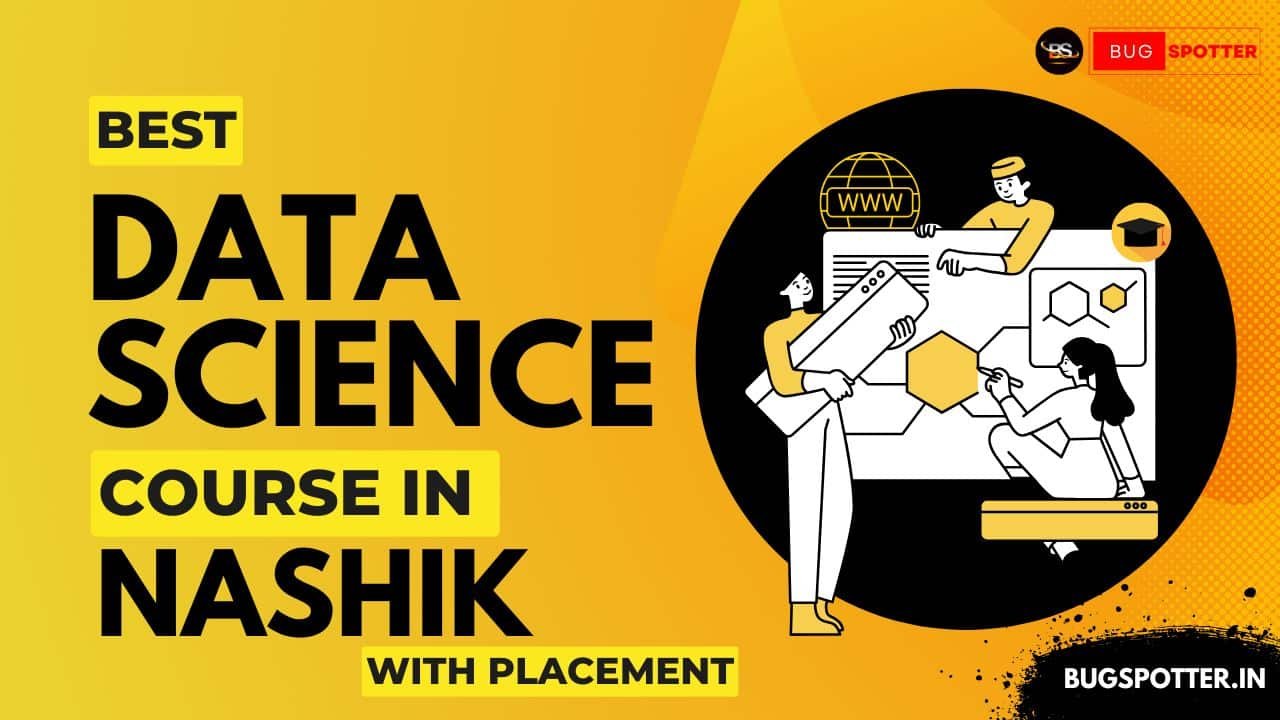Best Data Science Course In Nashik With Placement
100% Placement Assistance | Live Online Sessions
Data Science course : 4 Month Personalized Live Advance Data Science Training is taught by industry experts in a comprehensive & question-oriented format.
Enroll Before: 07 December, 2024
1000+
Students Trained
100%
Placement Assistance
07 December , 2024
Start Date
0%
EMI Available
7:30 AM - 9:30 AM
Lecture Timings ( IST )
Key Highlights Of The Advance Data Science Course
- 100+ Hours Of Live Class
- 50+ Hours of Videos
- 1-on-1 Mentoring Sessions
- 20+ Industry Tools Mastery
- In-Class Live Presentations
- 3+ Live Projects & Practice Assignments
- 100% Placement Assistance
- Resume & Interview Training
Get familiar with our online Python Data Science course syllabus.
Syllabus for Data Science Course
Online Advance Data Science Course in Pune is designed to teach students the basics to the advanced level concepts of Python Data Science with practice assignments and offline in-class projects which helps them to get placed in MNC’s.
Term 1
In this term, you will learn how to ace Python Basics, Python OOPS and Python Libraries like Pandas, Matplotlib, Numpy, etc…
Term 2
In this term, you will learn how to ace MySQL, AWS, Tools & IDE’S
Term 3
In this term, you will learn how to ace Framework and industry projects

The Career Opportunities After Completing a Data Science Course in Nashik
Data Engineer: Building and maintaining data pipelines, and working with data storage solutions and tools such as AWS Glue, Redshift, and MySQL.
Quantitative Analyst: Applying quantitative techniques to financial and business data, leveraging Python for data manipulation and analysis.
Data Analyst: Performing data analysis and visualization using tools like Pandas, Matplotlib, and PowerBI, and creating actionable insights from data.
Cloud Data Engineer: Working with cloud services and data pipelines, including AWS services like S3, EMR, and Athena.
DevOps Engineer: Implementing CI/CD pipelines and managing version control with Git, focusing on automation and integration in data engineering projects.
Tools You’ll Master










Data Science Salary In India (INR)
The salary of a Data Scientist in India varies based on experience, skills, and location. Here’s a simple breakdown:
1.Entry-level (0-2 years): ₹4,00,000 to ₹8,00,000 per year
2.Mid-level (2-5 years): ₹8,00,000 to ₹12,00,000 per year
3.Senior-level (5+ years): ₹12,00,000 to ₹20,00,000 per year
Mentors

Python Trainer
4+ Years ITExperience
4+ Years Teaching Experience

Project Trainer
5+ Years IT Experience
5+Teaching Experience

Digital Marketing
3+ Years IT Experience
2+Teaching Experience

Manual Trainer
5+ Years IT Experience
5+Teaching Experience
Our Learners Work At

























Enroll Now and get 5% Off On Course Fees
Bug Spotter Reviews
Introduction to Data Science
Data science is all about understanding and making sense of large amounts of data to find patterns, trends, and insights that help solve real-world problems. Think of it as being a detective, using data to uncover clues that guide better decisions in business, healthcare, and many other fields. With the increasing amount of data available today, data science plays a crucial role in helping us interpret that data and make informed choices.
Why Data Science Matters
Data science matters because data is everywhere. Every time you make an online purchase, scroll through social media, or even use your phone, data is being generated. Businesses use this data to understand their customers, improve products, predict future trends, and make smarter decisions. Data science takes all this raw data and transforms it into valuable insights that help companies succeed.
Key Components of Data Science
Data science involves several important steps that work together to turn raw data into useful information.
Data Collection and Data Sources
The first step is gathering data from different sources—such as websites, surveys, sensors, or social media. The more relevant and accurate the data, the better the insights you’ll get.Data Cleaning: The Foundation of Accurate Insights
Raw data often contains errors, missing values, or irrelevant information. Data cleaning is the process of fixing these issues—removing duplicates, correcting mistakes, and organizing the data so it can be analyzed properly.Data Analysis: Turning Data into Knowledge
Once the data is cleaned, data scientists analyze it to identify patterns, trends, and relationships. This is where the real insights are uncovered, helping businesses or organizations make better decisions.
The Process of Data Science
Data science follows a step-by-step process to extract meaningful insights from data. This process includes:
- Data Collection: Gathering data from various sources.
- Data Cleaning: Removing errors and organizing the data.
- Data Analysis: Finding patterns and trends in the data.
- Modeling: Using statistical and machine learning models to predict outcomes.
- Interpretation: Presenting findings in a clear and understandable way to guide decisions.
How Data Science Projects Are Structured
Data science projects typically start with a question or problem to solve—like predicting sales or understanding customer preferences. The steps involved are:
- Collecting and preparing the data.
- Analyzing the data.
- Building models or algorithms to make predictions.
- Presenting the results in a way that stakeholders can use to make decisions.
The Role of a Data Scientist
A data scientist is a professional who uses data to solve complex problems. They combine skills in statistics, programming, and business to analyze data and provide insights that drive decisions.
Key Responsibilities of Data Scientists
- Gathering and analyzing data to find trends and patterns.
- Building models to predict future outcomes or make decisions.
- Communicating findings clearly to help business leaders understand the data and take action.
Applications of Data Science
Data science is used in many industries to make better decisions. Here are some of its exciting applications:
Data Science in Healthcare
In healthcare, data science helps predict disease outbreaks, improve patient care, and personalize treatments based on individual data.Data Science in E-commerce
E-commerce businesses use data science to recommend products, predict shopping trends, and enhance the customer experience by understanding buying behavior.Data Science in Finance
Financial institutions use data science to detect fraud, assess risk, and make investment decisions by analyzing historical data and trends.
How to Get Started in Data Science
If you’re interested in becoming a data scientist, here’s how you can start:
1. Courses and Resources for Beginners
There are many online courses and tutorials that teach the basics of data science. Platforms like Coursera, edX, and Udemy offer beginner-friendly courses.
2. Practical Experience and Projects
One of the best ways to learn is by working on real projects. You can start by analyzing publicly available datasets and applying the techniques you’ve learned to solve problems.

Eligibility
for Data Science Course
1. Any Graduate Background
- You can come from any educational background—whether you’re an engineer, from commerce, humanities, or any other field. A degree is the only basic requirement.
2. Interest in Coding
- While prior coding experience isn’t mandatory, having a basic interest in coding will help. During the course, you’ll learn programming languages like Python, R, and SQL. Don’t worry if you don’t know coding yet—these skills can be picked up as you go!
3. Time Commitment
- A minimum of 3-4 hours per day is required to complete the course, which includes time for lectures, assignments, and practical exercises. Consistency and commitment are key to your success.
4. No Prior Experience Required
- No prior data science experience is required. The course is designed to take you from beginner-level concepts all the way to advanced topics, so you can start from scratch and still succeed.
5. Curiosity & Problem-Solving Mindset
- If you have a curious mind and enjoy solving problems, you’re already on the right path. Data Science is about exploring data and finding solutions to real-world problems, and this mindset will help you excel.
FAQs
Frequently asked questions
1. What is a Data Science course?
A Data Science course teaches you how to collect, clean, analyze, and interpret data to extract useful insights. You’ll learn to use tools and techniques such as programming, statistics, and machine learning to solve real-world problems. It’s an essential skill for industries like healthcare, finance, marketing, and technology.
2. Do I need a background in programming or math to take a Data Science course?
While having a background in math or programming can help, many Data Science courses are designed for beginners. Most courses start with basic programming concepts and gradually build up to more advanced topics. You can still succeed in the course if you’re committed to learning and practicing.
3. What skills will I gain from a Data Science course?
A Data Science course will teach you:
- Programming (mainly Python, R, SQL)
- Data cleaning and organizing messy data
- Data visualization (using tools like Tableau, Matplotlib)
- Statistics for analyzing data
- Machine learning for creating predictive models
- Big data tools like Hadoop and Spark (in advanced courses)
4. How long does it take to complete a Data Science course?
The duration of a Data Science course depends on the type of course:
- Short courses or bootcamps usually take a few weeks to a few months.
- Full-time diplomas or certifications can take 6 months to a year.
- Self-paced online courses vary depending on how much time you can dedicate.
5. Are Data Science courses difficult for beginners?
While Data Science involves technical concepts, many beginner-friendly courses start with the basics. If you’re new to programming or statistics, it may seem challenging at first, but with regular practice and persistence, you can master the skills over time.
6. What are the career opportunities after completing a Data Science course?
After completing a Data Science course, you can pursue various career paths, including:
- Data Analyst
- Data Scientist
- Machine Learning Engineer
- Business Intelligence Analyst
- Data Engineer
These roles are in high demand across industries like tech, healthcare, finance, e-commerce, and marketing.
7. Do I need a degree in Data Science to get a job?
A formal degree in Data Science can help, but it’s not always necessary. Many employers value practical skills and experience more. Completing a Data Science course, building a portfolio of projects, and gaining hands-on experience can help you land a job, even without a degree.
8. Can I take a Data Science course online?
Yes! Many online platforms like Coursera, edX, Udemy, and LinkedIn Learning offer Data Science courses from top universities and institutions. These courses allow you to study at your own pace and gain skills from home.
9. What are the prerequisites for taking a Data Science course?
Prerequisites vary by course, but most beginner-level courses don’t require prior experience. However, a basic understanding of mathematics (especially statistics) and programming (Python or R) can be helpful. Some advanced courses may require knowledge of machine learning or data engineering concepts.
10. Will I learn machine learning in a Data Science course?
Yes, most Data Science courses include machine learning as a key part of the curriculum. Machine learning allows you to build predictive models and analyze complex data. You’ll learn about algorithms like regression, classification, and clustering, which are essential for many data-driven applications.
11.What is the Data Science Course fees in Nashik?
Data Engineer
Roles and Responsibility for Data Engineer
Roles and Responsibility for Data Engineer
The key responsibilities of a data engineer typically include:
- Designing and building robust, scalable and reliable data pipelines to ingest, transform and load data from various sources.
- Implementing efficient data storage solutions, such as data warehouses, data lakes or NoSQL databases, to support reporting, analytics and business intelligence needs.
- Developing data transformation logic to clean, enrich and normalize data to ensure high-quality information.
- Collaborating with data analysts and business stakeholders to understand data requirements and design appropriate data models.
- Ensuring data quality, security and compliance through monitoring, alerting and continuous improvement processes.
- Deploying and maintaining data engineering solutions, including pipelines, data stores and supporting infrastructure.
- Sharing knowledge, best practices and lessons learned with the broader data engineering community.
Course Duration
Data Science in 3 Months?
Can I Learn Data Science in 4 Months?
Yes, absolutely! It is entirely possible to learn Data Science in 4 months, but it requires a high level of commitment and consistency. To make this happen, you’ll need to dedicate a minimum of 3-4 hours daily to studying and practicing Data Science. This time should be spent not just on watching lectures, but also on working through problems, hands-on exercises, and applying the concepts you learn to real-world scenarios. Regular practice is key to mastering important topics like Machine Learning, Data Analysis, Statistics, and Data Visualization.
Moreover, it’s important to fill any gaps in your learning by working on multiple projects. These projects help reinforce your understanding and give you practical experience, which is invaluable for job applications. Building a strong portfolio of real-world projects will make you stand out when applying for jobs. The more projects you complete, the more confident you will be in your skills.
However, learning Data Science in 3 months isn’t just about following a study schedule—it’s about consistency and focus. If you stay dedicated and stick to your routine without letting distractions get in the way, you can cover the essential topics in Data Science within this time frame. By the end of 3 months, with the right mindset and effort, you will not only have a solid understanding of the core concepts but also a portfolio of projects that can help you land a job in the field.
In short, if you’re willing to put in the work and follow a structured plan, it’s definitely possible to learn Data Science and be ready for a job in just 3 months.


